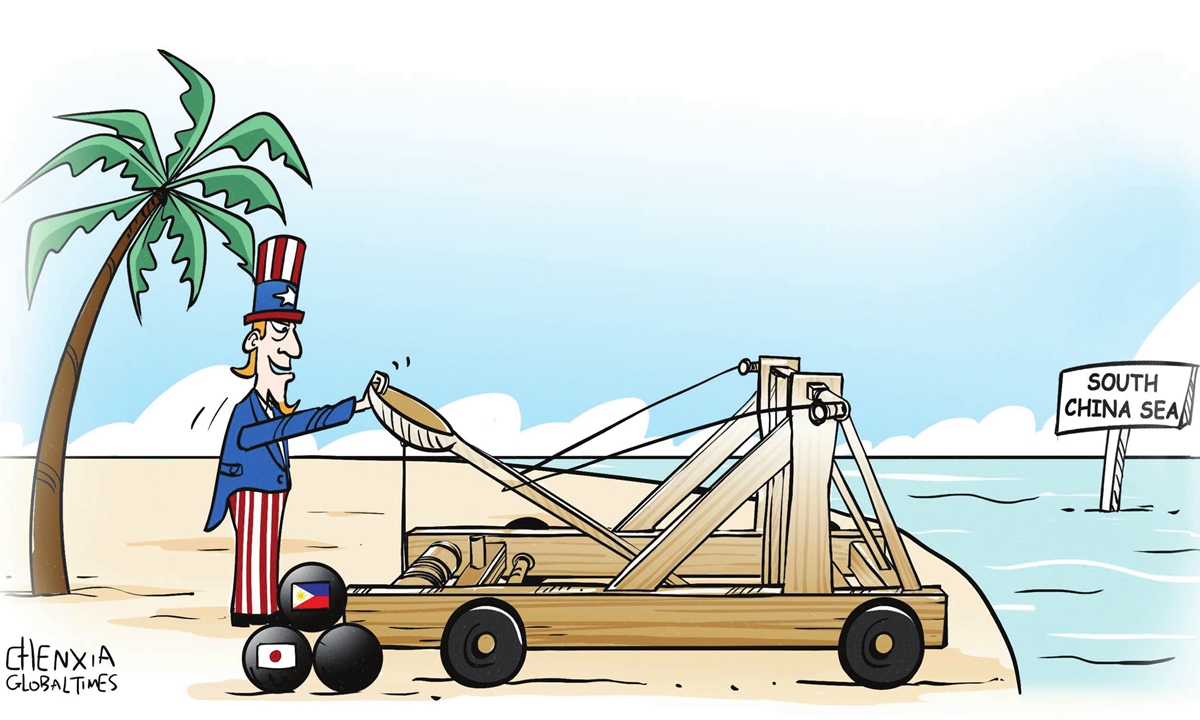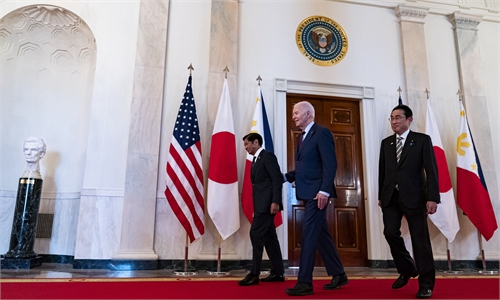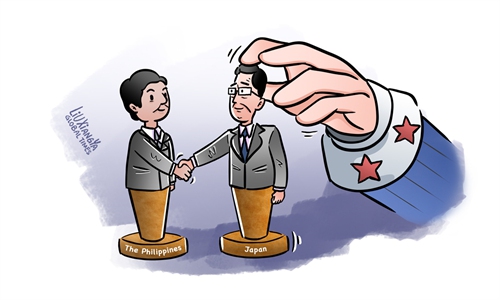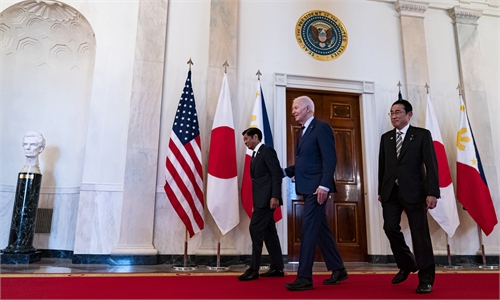US' minilateral frameworks run counter to global tide

Illustration: Chen Xia/GT
On Thursday, the trilateral summit between President Joe Biden of the US, Prime Minister Fumio Kishida of Japan and President Ferdinand Marcos Jr of the Philippines took place in Washington. Following the meeting, the three parties issued a joint statement announcing plans to enhance defense cooperation under the disguise of "advancing the security and prosperity of the Indo-Pacific region and the world."
This scene is all too familiar, as in recent years, the US has adeptly rallied allies and woven a network of containment against China in the Asia-Pacific region. For instance, in 2017, the US revived the Quad with Japan, India and Australia, and in 2021, the trilateral security partnership AUKUS was established involving the US, the UK and Australia.
These initiatives, cloaked in Cold War thinking and bloc politics, essentially aim to suppress potential competitors and serve the US' global hegemonic status.
In the 1950s and 1960s during the Cold War, the US signed treaties with various countries and regions, including the Treaty of Mutual Cooperation and Security between the US and Japan, the Mutual Defense Treaty between the Philippines and the US, ANZUS between Australia, New Zealand and the US, the Mutual Defense Treaty between the US and South Korea, the Southeast Asia Collective Defense Treaty, and the Mutual Defense Treaty between the US and China's Taiwan region. This has constructed a predominantly China-targeted military system in the Asia-Pacific.
Today, the series of bilateral or minilateral security cooperation frameworks established by the US in the Asia-Pacific, including the US-Japan-Philippines cooperation, serve as main pillars for the US empire. Its purpose remains to secure the "long-term stability" of US hegemony. In the context of China's pursuit of peaceful development, its commitment to peacefully resolving disputes in the South China Sea, and the overall strengthening of ASEAN's relations with China, the US' insistence on Cold War thinking and containment of China runs counter to the global tide and poses a persistent threat to world peace and regional stability.
The South China Sea issue is just an excuse for major powers outside the region to exaggerate the "China threat" and manipulate regional affairs. The existence of US hegemony in East Asia will be questioned if the waters of this region are clear and calm. The Philippines' actions in the South China Sea are essentially just a token of allegiance to the US. It hopes to gain not only security and military benefits from major powers outside the region like the US and Japan, but also some economic benefits, since the US is trying to reconstruct the regional industrial chain and win over some of China's neighboring countries. The US is doing this in order to build an economic anti-China circle in order to achieve its sinister purpose of weakening China's economic development.
Such efforts were further exemplified in the Joint Vision Statement from the Leaders of Japan, the Philippines and the United States, which articulated that "Our three nations resolve to promote enduring, inclusive economic growth and resilience in our countries and the broader Indo-Pacific," "Our three nations seek to expand trilateral cooperation in the Philippines on the deployment of clean energy technologies," and "President Biden reaffirms the ironclad US alliance commitments to both Japan and the Philippines, which have helped safeguard peace and security in the Indo-Pacific for decades."
Under the inducement of the US, the Philippines did not hesitate to break its promise and shift its problems onto China by adopting the policy of following the US to contain China. The current government in the Philippines, in collusion with major powers outside the region, has taken provocative actions in the South China Sea. On the surface, it seems the Philippines is pursuing its national interests. However, the truth is it serves Washington's hegemonic interests.
The Chinese government is committed to resolving disputes between countries in the South China Sea through peaceful means. Its persistence in peace is the guarantee for maintaining stability in the region. However, this does not mean that the Chinese government will tolerate the reckless behaviors and shameless challenges from other countries.
The author is the director of the Center for Philippine Studies at Jinan University in South China's Guangdong Province. opinion@globaltimes.com.cn



